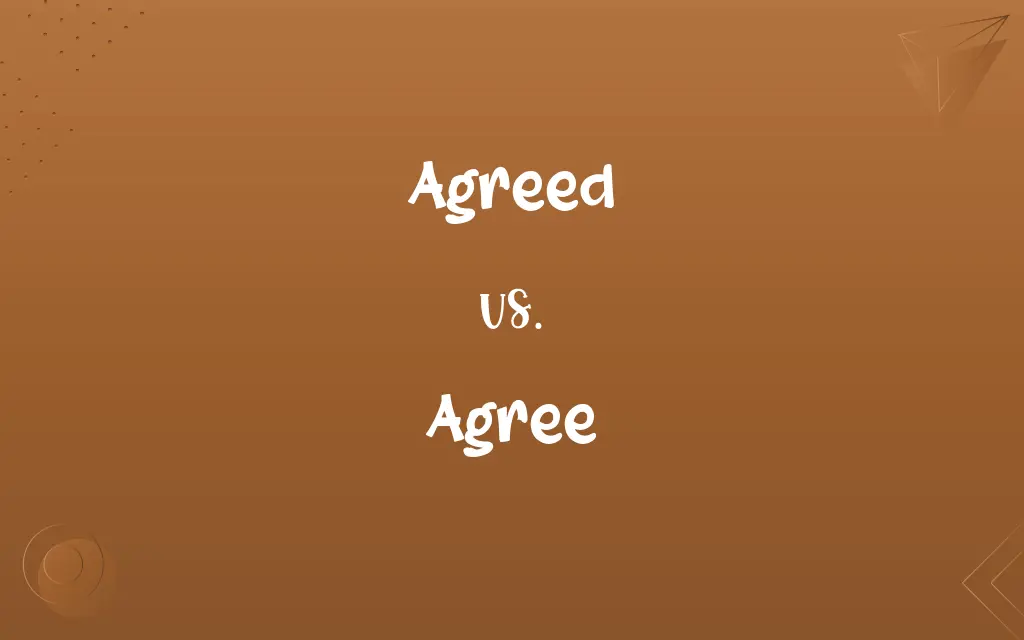Agreed vs. Agree: Know the Difference

By Dua Fatima & Shumaila Saeed || Published on June 25, 2024
"Agreed" is the past tense of "agree," indicating a consensus reached in the past, while "agree" is the present tense, used for current agreements or to express concurrence.

Key Differences
"Agree" is a verb in the present tense, used when individuals concur on a point, decision, or idea at the current moment. It reflects an ongoing or recent consensus among parties. On the other hand, "agreed" is the past tense form, indicating that the agreement was reached at an earlier time. It's used to refer to decisions, arrangements, or opinions that were previously established.
Dua Fatima
Jun 25, 2024
In terms of usage, "agree" is employed in scenarios where individuals are currently in the process of coming to a consensus or when someone is expressing their concurrence with a statement or idea. For example, during negotiations or discussions. Conversely, "agreed" is used when referring back to agreements made in the past, such as settled negotiations or previously held beliefs.
Shumaila Saeed
Jun 25, 2024
The form "agree" can be adapted to fit different grammatical moods and tenses, signifying the action of agreement in various contexts, including the future or conditional. "Agreed," while primarily used in the simple past, can also function as a past participle or an adjective, further describing the nature of the agreement or the consensus that was reached.
Dua Fatima
Jun 25, 2024
Expressing agreement in the form of a response or feedback, "agree" can be used in questions or statements looking for affirmation, as in seeking someone's agreement on the spot. Meanwhile, "agreed" often appears in summaries of meetings, written agreements, or when recounting events where decisions were made.
Dua Fatima
Jun 25, 2024
In informal contexts, "agreed" can be used as a standalone interjection to express a strong concurrence with something that has been said or proposed, highlighting a collective decision or a personal stance that aligns with others. This usage underscores the communal aspect of reaching an agreement, whereas "agree" focuses on the act of consenting or arriving at a mutual decision.
Dua Fatima
Jun 25, 2024
ADVERTISEMENT
Comparison Chart
Usage
Expressing current concurrence or the process of reaching a consensus.
Referring to past agreements or decisions made.
Shumaila Saeed
Jun 25, 2024
Adaptability
Can be used in various tenses and moods for current or future agreements.
Primarily used in the simple past but can also function as a past participle or adjective.
Dua Fatima
Jun 25, 2024
Context
Questions, statements, or discussions seeking or expressing agreement.
Summaries of decisions, written agreements, or recounting past agreements.
Dua Fatima
Jun 25, 2024
Informal Usage
Less commonly used as a standalone statement.
Often used as an interjection to express strong concurrence with past decisions or proposals.
Dua Fatima
Jun 25, 2024
ADVERTISEMENT
Agreed and Agree Definitions
Agreed
To have the same opinion or view as someone else.
I agree with your point about environmental protection.
Hifza Nasir
Mar 05, 2024
Agree
Past tense of agree, indicating a consensus reached previously.
We agreed on the budget last meeting.
Dua Fatima
Mar 05, 2024
Agreed
Expresses concurrence in the present tense.
We agree that the project needs more resources.
Hifza Nasir
Mar 05, 2024
Agree
Can serve as an adjective describing something decided upon.
The agreed terms were beneficial for both sides.
Dua Fatima
Mar 05, 2024
Agreed
Used in forming agreements or consensus in discussions.
Do you agree to the terms discussed?
Dua Fatima
Mar 05, 2024
ADVERTISEMENT
Agree
Refers to past decisions or beliefs.
It was agreed that the policy needed change.
Dua Fatima
Mar 05, 2024
Agreed
Often involves active participation in the agreement process.
Both parties must agree for the contract to be valid.
Hifza Nasir
Mar 05, 2024
Agree
Functions as a past participle in compound tenses.
The terms had been agreed upon before the announcement.
Shumaila Saeed
Mar 05, 2024
Agreed
Can indicate future intention to consent.
They agree to meet next week to finalize the deal.
Dua Fatima
Mar 05, 2024
Agree
Used as an interjection to express strong concurrence.
Agreed! he exclaimed, supporting the decision.
Dua Fatima
Mar 05, 2024
Agreed
United by being of the same opinion;
Agreed in their distrust of authority
Dua Fatima
Mar 05, 2024
Agree
To make a stipulation by way of settling differences or determining a price; to exchange promises; to come to terms or to a common resolve; to promise.
Agree with thine adversary quickly.
Didst not thou agree with me for a penny ?
Shumaila Saeed
Mar 05, 2024
Agree
To come to an understanding or agreement, as by negotiating
We agreed on the price.
Dua Fatima
Mar 05, 2024
Agreed
To be suitable, appropriate, pleasing, or healthful
Spicy food does not agree with me.
Shumaila Saeed
Mar 05, 2024
Agree
To admit, or come to one mind concerning; to settle; to arrange; as, to agree the fact; to agree differences.
Hifza Nasir
Mar 05, 2024
Agreed
To share an opinion or feeling; be in accord
I agree with you on that. We agree in our taste in music.
Dua Fatima
Mar 05, 2024
Agree
To share an opinion or feeling; be in accord
I agree with you on that. We agree in our taste in music.
Dua Fatima
Mar 05, 2024
Agree
To be compatible or consistent
The copy agrees with the original. Your story agrees with mine.
Dua Fatima
Mar 05, 2024
Agree
To yield assent; to accede; - followed by to; as, to agree to an offer, or to opinion.
Shumaila Saeed
Mar 05, 2024
Agree
To be conformable; to resemble; to coincide; to correspond; as, the picture does not agree with the original; the two scales agree exactly.
Dua Fatima
Mar 05, 2024
Repeatedly Asked Queries
How is "agree" used in a sentence?
"Agree" is used to express or ask for concurrence, e.g., "Do we agree on the next steps?"
Dua Fatima
Jun 25, 2024
Can "agreed" be used as an adjective?
Yes, "agreed" can function as an adjective to describe something that was decided upon.
Dua Fatima
Jun 25, 2024
Can "agree" indicate future actions?
Yes, "agree" can indicate future intentions or plans to consent, as in agreeing to future terms.
Dua Fatima
Jun 25, 2024
Is "agreed" only used in formal contexts?
No, "agreed" can be used both formally, to reference past agreements, and informally as an interjection.
Shumaila Saeed
Jun 25, 2024
What is the difference between "agree" and "agreed"?
"Agree" is used for current or ongoing agreements, while "agreed" refers to agreements made in the past.
Dua Fatima
Jun 25, 2024
Can both "agree" and "agreed" be used in legal contexts?
Yes, both are used in legal contexts, with "agree" for current consents and "agreed" for referencing past agreements.
Dua Fatima
Jun 25, 2024
What does "agreed" as an interjection mean?
As an interjection, "agreed" expresses strong agreement or concurrence with a statement or proposal.
Shumaila Saeed
Jun 25, 2024
How do I know whether to use "agree" or "agreed"?
Use "agree" for present or future contexts and "agreed" when referring to past agreements or decisions.
Dua Fatima
Jun 25, 2024
What role does "agree" play in negotiations?
"Agree" is crucial in negotiations as it signals the parties' consent to terms or conditions being discussed.
Hifza Nasir
Jun 25, 2024
Is it correct to say "We have agreed" for ongoing agreements?
"We have agreed" typically refers to past agreements, but it can imply that the agreement is still relevant or ongoing.
Hifza Nasir
Jun 25, 2024
How does "agree" relate to consensus building?
"Agree" is a key term in consensus building, signifying that all parties are working towards or have reached a mutual understanding.
Dua Fatima
Jun 25, 2024
Can "agree" be used in questions?
Yes, "agree" is often used in questions seeking affirmation, e.g., "Do you agree?"
Hifza Nasir
Jun 25, 2024
What is the significance of using "agreed" in meeting summaries?
Using "agreed" in summaries highlights decisions made and consensus reached during the meeting, providing a record for future reference.
Shumaila Saeed
Jun 25, 2024
Can "agreed" indicate a unanimous decision?
Yes, "agreed" can indicate that all parties involved reached a unanimous decision in the past.
Hifza Nasir
Jun 25, 2024
Can "agree" and "agreed" be used interchangeably?
They cannot be used interchangeably as they represent different tenses and contexts of agreement.
Dua Fatima
Jun 25, 2024
Share this page
Link for your blog / website
HTML
Link to share via messenger
About Author
Written by
Dua FatimaCo-written by
Shumaila SaeedShumaila Saeed, an expert content creator with 6 years of experience, specializes in distilling complex topics into easily digestible comparisons, shining a light on the nuances that both inform and educate readers with clarity and accuracy.









































































